感謝の気持ち
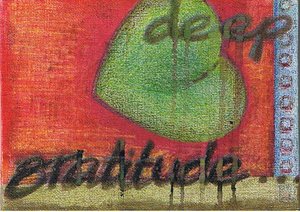
While having no alternative page on this homemade website, I have included a tribute here to a very dear friend, Michelle Laurice Goulevitch. People are welcome to download the attached PDF to share in her memory.
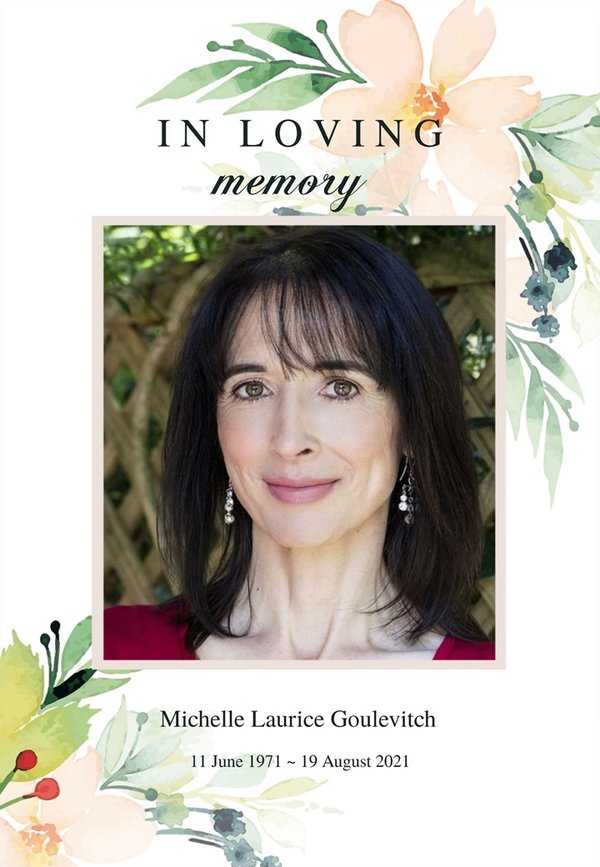
ページトップに戻る
Mum, you were always there for me when I was growing up, and you were there for me again when it counted. I am sorry for the shock and torment caused by my return from Japan with a doctor induced benzodiazepine dependency. This certainly wasn’t the plan we had in mind after you made so many sacrifices to help get me through university with a Degree in Japanese.
I know the one and a half years that I spent at home during my withdrawal and initial recovery placed an enourmous amount of stress on you and that in turn had an effect on your own health. I am also sorry for the additional burdens placed on you by my subsequent case for compensation in the Japanese courts. Due to the additional damages created by the courts, and the Fukushima disaster, it is also regrettable that I haven’t been able to look after you during your retirement years either, or even visit you for that matter.
However, I would just like to say thank you so much for your loving support, as always, and I hope that someday something good will come of all this. Take care and love always.
Your son,
Wayne
ページトップに戻る
Thank you very much Dr. Judson for your kindness, selfless support and understanding throughout what was a long and grueling case. Your efforts went well beyond the calls of duty.
I very much appreciate the time you sacrificed including the countless weekends and even your Christmas break time. Your commitment to your job and your empathy towards people suffering from the torment of (doctor induced) drug dependency is most impressive.
I am very sorry that, despite all your efforts, the Japanese courts never allowed you the opportunity to testify in the case, and similarly, I am sorry they completely ruled any possibility that I was in fact benzodiazepine dependant despite the clear evidence and arguments that we put forward.
However, I am determined to make sure that our efforts were not in vain. I can now fully understand the importance of the work you and others like you do. Thank you once again, and all the best for your future endeavours.
ページトップに戻る
この場を借りて、世界中のベンゾジアゼピンを取り巻く環境の改善に多大な貢献を果たしたアシュトン教授に感謝の意をお伝えします。非常に多くの人たちが同じ気持ちでいることに間違いはありません。
個人的な経験を通して、あるいはベンゾジアゼピンについて長期間勉強して気付いたことは、多くの医師たちは(特に一昔前の医師は)ベンゾジアゼピン依存の患者や被害者を扱うことを嫌がる傾向があるということです(言い換えると、多くの医師が、自分自身あるいは他の医師の無知によって引き起こされた問題の後始末をすることは厄介だということに気付いているということ。)
患者や被害者にとって幸運なことに、アシュトン教授は、実際に時間をかけてじっくりと患者の声に耳を傾けることにより、問題の多くは必ずしも患者の責任ではないことを知るようになった医療専門家の一人です。
そこで、私から個人的に、また、苦しんだ多くの人たちの声を代弁して感謝の気持ちをお伝えします。 ――― 本当に有難う!
ページトップに戻る
I am most grateful to my then lawyer who for many years poured his heart and soul into my case for benzodiazepine dependency. I can clearly recall how you read book after book on benzodiazepines and the passion you exuded in bringing this case to the attention of the authorities with a view to making the prescribing of these drugs safer in Japan. I can also recall the many sacrifices you made along the way often working weekends and often working beyond the call of duty.
It was very much a rollercoaster 6 or so years together with many trials and tribulations along the way. Despite the extremely demanding nature of the case, and although having a rather harsh nature, you often exercised good judgment in knowing when to push me and when to ease off, realizing the pressures of the case and the fact that my previous doctor induced benzodiazepine dependency had left me vulnerable to that pressure.
As I have always said from the very beginning, regardless of the outcome, I will always appreciate your efforts. Although the end result was disappointing, the fact remains that doctor induced benzodiazepine dependency is a significant problem both in Japan and indeed worldwide. With that in mind, I was happy to share the journey with you, where a determined Westerner teamed up with a harsh natured Japanese lawyer to help make a difference. Thank you very much once again.
ページトップに戻る
I would very much like to thank my good friend and Chinese doctor (John) who so tentatively helped me through withdraw. Following the treatment, which included acupuncture, Chinese herbs, therapeutic massages etc. we became good friends. I also thank you for your ongoing friendship.
ページトップに戻る
I’d very much like to thank a good family friend. It’s with thanks to you that I was able to make a return trip to Japan for my testimony. After exhausting all possible avenues and feeling at a complete loss, you were there to help make it possible by lending me the money I needed for my airfare. I am also happy that, despite all the difficulties I faced, I was able to return this to you. I would further like to thank you for looking out for my Mother during these difficult times and for your ongoing support and encouragement along the way. Thank you so much!
ページトップに戻る
Throughout this entire ordeal, there was one friend who was always there the whole time. He was there before my doctor induced benzodiazepine dependency, during it, after it, and he was there again throughout the entire duration of my court case in Japan. His name is Edward TeUa.
Ed, I would like to thank you so much for your ongoing support and encouragement throughout this entire ordeal. You are one of the very few people who were there when I was down (during dependency). You are also one of the very few people who can show an understanding of what I have been doing (the court pursuit and other follow-on work) and why.
I always appreciated the times that you called in on me in Omiya (Saitama, Japan) to see if I was doing okay when I was unwell. This thoughtlessness and consideration carried through to the period during my recovery back in New Zealand, and then again through to the period during my court case in Japan. Although no longer in Japan yourself, you were there again (in wairua) always giving me positive encouragement over the phone showing an understanding of the bigger picture and the importance of the cause.
I often called you after court hearings when you shared in the thrill of the chase and gave encouragement to stand up for what is right, not only by me, but by society everywhere in general. If I was to ever end up in the trenches along side anyone, it would defiantly be you. When you go through something like I have, you learn a lot, not only about yourself, but also about those around you. You know what I mean…Thanks again bro – Kamo te wehi !
ページトップに戻る
I will never forget the kindness of my university lecturer in Japanese from my university days who kindly offered to help me with various translations both during my court case and during the construction of this website. I also appreciate very much the ongoing moral support you have given throughout this long arduous journey. Thank you so much!
ページトップに戻る
Many thanks go out to the person who built this website. Thank you so much for spending so much of your valuable time to make sure this website was constructed in a way that is easy to view and navigate, especially for people who are suffering from dependency and withdrawal. I also appreciate very much the kind allowances you have made to accommodate my desperate circumstances. Thank you!
ページトップに戻る
I would like to thank all the people who have helped with various translations. These include:
- Translations during my court case
- Translations for this website
- Translation of The Ashton Manual in Japanese
I would like to thank my lawyer who translated many documents during the early stages of the court case which was well over and above the call of duty. Thank you so much.
Further, I would also like to thank the people who shared their valuable time to help translate the content of this website; including many of my bilingual friends, university lecturers etc. Without your kind help none of this would have been possible. Thank you so much everyone!
Finally, I would like to thank the translators of The Ashton Manual in Japanese for allowing me the opportunity to finalize the translation together.
I think it is commendable how the main translator dedicated his time to such a mammoth task whilst still suffering the effects of protracted withdrawal. I fully understand how difficult things have been but through your efforts you can derive some comfort in the knowledge that there will be:
One less case of family violence, one less father jumping in front of a train on the way home, one less baby being born dependent and/or with defects, one less child being exposed to the seriously ill-effects of these kinds of drugs, one less case of assault and battery, one less otherwise extremely skilled person being removed from the workforce and placed on an invalid’s benefit, one less report of violent crime, one less murder, one less (traffic, work, home, etc) accident, one less case of prescription funding, one less person in hospital queues, one less person being subjected to physical and mental torment, one less person being committed to a mental institution, one less person being blamed and humiliated for something that wasn’t their fault, one less case in an already overloaded court system, one less case of street drug abuse………
What an outstanding contribution! I sincerely hope that you are able to get some closure on your own ordeal and that you are able to recover enough to at least reach some degree of comfort in your own life – you deserve it!
ページトップに戻る
I would like to take this opportunity to thank Ray Nimmo, who despite having been through so much with his own doctor induced benzo dependency, has given so much of his time to help so many others through his website benzo.org.uk which provides a massive amount of resources including work from several world leading experts. I would also like to thank Ray for helping coordinate the publicizing of The Ashton Manual in Japanese. Thank you Ray; You're a champion!
ページトップに戻る
Visit benzo.org.uk and read Ray’s story

Extract from Ray's Story
Background. Following dental treatment in 1984 I had an allergic reaction to Flagyl (metronidazole) - an antibiotic. Among other things I had severe pain in the right side of my abdomen. My GP said it was a muscle spasm and prescribed Xanax (alprazolam) - a benzodiazepine tranquilliser which he called a muscle-relaxant. The pain would not go away so I returned to my GP a number of times and was prescribed a succession of benzodiazepines: Tranxene (clorazepate), Librium (chlordiazepoxide), Frisium (clobazam) as well as Libraxin (chlordiazepoxide + clidinium) and Dormonoct (loprazolam) before I got some pain relief from Valium (diazepam). I was however becoming anxious and depressed but did not realise at the time that the drugs I was being prescribed for muscle pain were themselves responsible for this. I was never warned about the possibility of habituation, or the existence of a withdrawal syndrome. The drugs were described and prescribed to me as muscle relaxants, not anxiolytics. In 1984, with obviously no access to the Internet - or to other medical resources - I saw no reason not to trust my doctor's judgement.
By early 1985 I was prescribed 90mg diazepam daily and I was quite heavily sedated. The anxiety and depression got worse and I was prescribed a variety of anti-depressants both by my doctor and by a psychiatrist I was referred to. The new drugs did not help. For the next fourteen years I was repeatedly told I suffered from anxiety with depression and my GP said I would need to take diazepam for the rest of my life. I became housebound and reclusive - severely depressed and frightened of my own shadow. The abdominal pain I had first presented with continued through all these years too. The GP reduced my dose of diazepam twice - from 90 to 60mg and some time later from 60 to 30mg. On both occasions I experienced major problems but did not at the time realise they were associated with dramatic reductions in dose.
Withdrawal. In 1998 my wife spoke to a new GP in our area and he agreed to help me if I would see him as a patient. He diagnosed benzodiazepine addiction and strongly suspected that my depression was induced by long-term benzodiazepine use. Over a period of 3 months he helped me to reduce the 30mg diazepam to zero although with hindsight, the 5mg reductions I made every two weeks were perhaps a little too aggressive. As I reduced the dosage I began to feel better - the depression started to lift and I became less anxious, agitated and fearful. The abdominal pain I had first presented with in 1984 also disappeared. For about ten days off the drugs I felt really well and then suffered an explosion of symptoms. The reason for this delay is of course because of the half life of diazepam and its long-acting active metabolites.
Withdrawal Symptoms. I suffered from a wide range of perplexing and often bizarre symptoms: tinnitus, headaches, sensory disruption (hyperacusis, photosensitivity, vivid 3D vision, blurred vision and seeing thorough a veil, sore, itchy eyes, metallic taste, weird sense of smell [hyperosmia, kakosmia], impaired balance and co-ordination, pins and needles, blepharospasm, fasciculations), electric shock sensations all over my body, muscular and joint problems (aches and pains in face, scalp, jaw, teeth, limbs and back, stinging, burning and twitching muscles, hyperreflexia), dizziness, insomnia, poor short-term memory and concentration, rapid weight loss, gastrointestinal problems, dysphagia, hyperthermia, tremors, hyperventilation, allergic reactions, derealisation and depersonalisation.
LONG-TERM PROBLEMS / PERMANENT DAMAGE. After the first two years off the drugs, most of the above-mentioned symptoms had resolved. However, a number of problems, including constant bilateral tinnitus, paraesthesiae, muscular spasms, fasciculations, headaches and intermittent jaw and facial pain have persisted. After fourteen years, I suspect that these are permanent.
PROFESSOR LADER'S REPORT. In 2000 I contacted a solicitor about suing my prescribers for clinical negligence. My case was ultimately successful and achieved an out-of-court settlement in 2002. As part of the process I was interviewed by Professor Lader on July 20, 2001 in London. Here are some extracts from an 18 page Causation Report prepared by Professor Malcolm H Lader, Professor of Clinical Psychopharmacology, Institute of Psychiatry, London SE5 8AF. The Report speaks for itself. It concludes that the harm inflicted on me was the result of clinical negligence ie. the original misprescription, misdiagnosis of depression and anxiety and failure to recognise drug-induced symptomatology.

このサイトの主要言語は英語です。
その翻訳は私自身を含む複数の人によって手がけられました。
私の母国語は日本語ではありませんので何卒ご理解いただきたくお

このサイトの一部はまだ日本語に翻訳されていない部分があります
裁判という究極のストレスに悩まされるチャレンジにおいて、私はいつもラグビーNZ代表のオールブラックス、とりわけキャプテンのリッチー・マコウ(Richie McCaw)からインスピレーションを得て、それを活かしていました。

状況がどんなに厳しくなろうと、どんなに不当に扱われようと、彼らが不平を言うことは決してなく、ただただ前進していくのです。
素晴らしい!
There were many challenges in my case.

These included fighting a world famous doctor in another country and language, acting as go-between for a harsh natured Japanese speaking lawyer and a sensitive natured English speaking doctor, making my Supreme Court Appeal whilst evacuating from Fukushima etc during the 3/11 disaster etc…
A lot of people were surprised that I did not bear a grudge against the prescribing doctor, but I felt anyone can make mistakes.

What got me though, was the fact he showed no remorse even after the evidence had been made clear.
アシュトンマニュアル:世界的な専門家、ヘザー・アシュトン教授によって書かれた、ベンゾジアゼピン系薬剤と離脱法についての解説書。
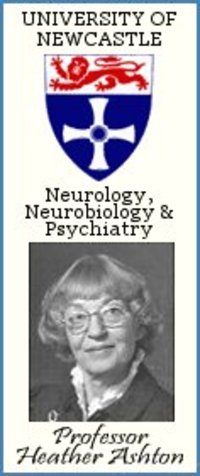
このマニュアル内で示された離脱スケジュールは単に“一般的な指針”を示すために作成されたものであることを、あなたの処方医に伝えることが大切です。離脱の経験は人それぞれで、同じものがない。離脱の経過は多くのファクター(要因)に影響されるからです。
「服用期間中であっても(たとえ薬を飲み続けていたとしても)離脱症状が起きる可能性はある」私と弁護士が裏づけのある論文を必死で探していた時に、アシュトン博士との初めての出会いがありました。
博士には、その後も、要となる情報だけでなく、その他の役に立つ情報もあわせて頂いております。
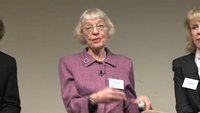
私たちはそれ以降も緊密な連絡を取り続け、手がつけられないほど広がってしまったこの「社会問題」に注意喚起をする努力をしてきました。
アシュトンマニュアルの日本語訳の協力もそのひとつです。
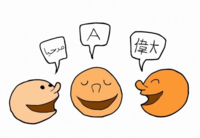
You may be interested to see the notes on corrections of Japanese translation errors, which were contained in the dependency medical report translations, together with explanations of the nature of these errors, and consider their potential implications on the case.
This is very interesting!
I went from being barely able to walk when I was on benzodiazepines to being able to squat 180kgs following abstinence and rehabilitation.







